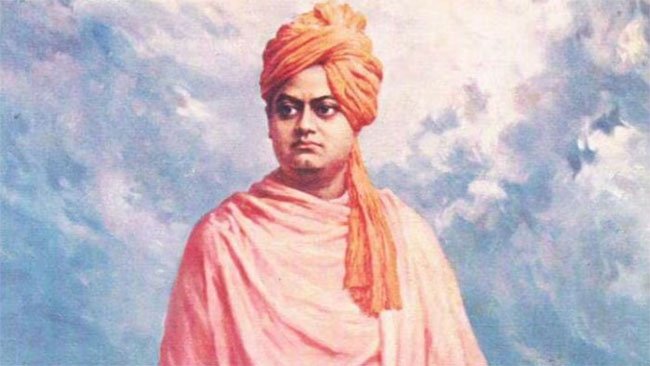Swami Vivekananda stands as one of the most powerful spiritual reformers of modern India — a monk whose message awakened not only the nation but the entire world. His fearless representation of Hinduism at the World’s Parliament of Religions in Chicago in 1893 transformed global perception of Indian spirituality and placed Vedanta on the world map.
Table of Contents
Early Life: Birth of Narendranath Datta
Born on 12 January 1863 in Calcutta, Swami Vivekananda was originally named Narendranath Datta. His father, Vishwanath Datta, was a distinguished lawyer known for his progressive and logical views, while his mother, Bhuvaneshwari Devi, was deeply spiritual. Growing up in a household that balanced intellect and faith, young Naren naturally developed a thirst for deeper knowledge.
From childhood, he possessed a brilliant memory, leadership qualities, and a bold, adventurous spirit. In school and college, he excelled academically and participated in sports like wrestling and boxing. But alongside material development, something inside him constantly searched for the true nature of God.
Meeting Sri Ramakrishna: Turning Point of His Life
Narendranath’s life took a decisive turn in 1881 when he met Sri Ramakrishna Paramahamsa at Dakshineshwar. Initially skeptical of Ramakrishna’s deep devotion to Goddess Kali, Naren questioned every belief through logic. Yet, with time, he realized that Ramakrishna was not just a devotee but a master of spiritual realization.
Ramakrishna eventually declared young Naren to be his spiritual heir, and shortly before his passing in 1886, he initiated him and other disciples into the monastic life. From that moment, Narendranath became Swami Vivekananda — a monk dedicated to serving humanity.
Wanderings Across India: Understanding the Soul of the Nation
After Ramakrishna’s passing, Vivekananda traveled across India as a wandering ascetic. On this journey, he interacted with royal families, scholars, laborers, and the poorest of the poor. These experiences deeply shaped his philosophy that true spirituality must uplift society — especially the suffering masses.
Chicago 1893: The Moment That Changed History
Encouraged by followers, Swami Vivekananda travelled to the USA to represent Hinduism at the World’s Parliament of Religions in Chicago. His opening words, “Sisters and Brothers of America,” received a standing ovation and marked the beginning of a historic movement.
In one of his most powerful messages, he proclaimed:
“Help and not fight; assimilation and not destruction; harmony and peace and not dissension.”
The world was stunned by his charisma, wisdom, and ability to unify religions rather than divide them.
For several years, he traveled throughout the United States and Britain, founding Vedanta societies, delivering lectures, and inspiring countless truth-seekers.
Ramakrishna Math & Ramakrishna Mission: Service to Mankind
Upon returning to India in 1897, Vivekananda established Ramakrishna Mission and later Ramakrishna Math at Belur. His mission connected spiritual transformation with humanitarian service — a revolutionary approach for that era. He believed:
“Serving the poor is equal to worshipping God.”
His teachings emphasized:
-
Oneness of all existence
-
Strength of character and physical fitness
-
Spiritual growth through karma (service), bhakti (devotion), and jnana (knowledge)
-
Freedom from superstition and blind faith
Final Years and Immortal Legacy
After his second visit to the West, Swami Vivekananda’s health declined. On 4 July 1902, at the age of just 39, he entered Mahasamadhi. Though his physical presence ended early, his footsteps reshaped the world.
Today:
-
His birth anniversary (January 12) is observed as National Youth Day in India
-
Ramakrishna Math and Ramakrishna Mission have 200+ centers worldwide
-
Vedanta societies continue to spread his message in the West
Swami Vivekananda remains a timeless symbol of youth empowerment, spiritual strength, and universal brotherhood.
Swami Vivekananda’s story is not just a biography — it is a reminder of the infinite potential within every human being. His life teaches us to be fearless, compassionate, and self-disciplined, and to work for the welfare of all.
Frequently Asked Questions About Swami Vivekananda
1. Who was Swami Vivekananda?
Swami Vivekananda was a Hindu monk, philosopher, and one of the most influential spiritual leaders of modern India. He introduced Vedanta and Yoga to the Western world and represented Hinduism at the Parliament of Religions in Chicago in 1893.
2. What was Swami Vivekananda’s childhood name?
His childhood name was Narendranath Datta, often lovingly called Naren by his family and close ones.
3. When and where was Swami Vivekananda born?
Swami Vivekananda was born on 12 January 1863 in Calcutta (now Kolkata), India. His birthday is celebrated in India as National Youth Day.
4. Who was Swami Vivekananda’s guru?
His spiritual guru and guiding force was Sri Ramakrishna Paramahamsa, the revered mystic of Dakshineshwar.
5. What is the significance of Swami Vivekananda’s Chicago Speech?
His Chicago address at the World’s Parliament of Religions (1893) introduced the world to the universal values of Hinduism and emphasized harmony, peace, and respect among all religions. It marked India’s spiritual presence on the global stage.
6. What organizations did Swami Vivekananda establish?
He founded Ramakrishna Mission and Ramakrishna Math, dedicated to spiritual development and humanitarian service.
7. What were Swami Vivekananda’s core teachings?
His core teachings included:
-
Oneness of all beings
-
Service to humanity as worship
-
Strength of character and discipline
-
Spirituality free from dogma and superstition
-
Balance of body, mind, and soul
8. When did Swami Vivekananda die?
Swami Vivekananda passed away on 4 July 1902 at the age of 39, attaining Mahasamadhi.
9. Why is Swami Vivekananda important today?
Swami Vivekananda inspires millions with his message of fearlessness, self-confidence, youth empowerment, and universal brotherhood. His life and work continue to guide spiritual seekers as well as those working for social upliftment.
You may also like –
Swami Vivekananda Quotes: Awakening the Power Already Within You

